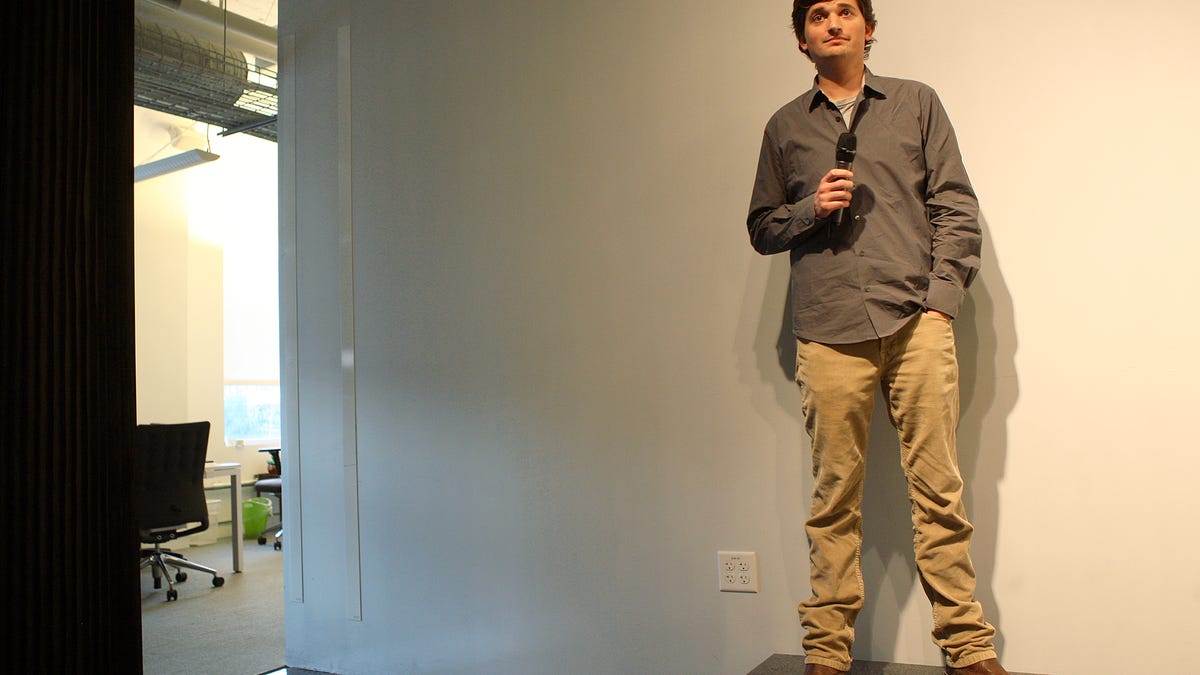App.net: A social network made possible by Facebook and Twitter
Newly funded App.net may be in its infancy, but it's already attracting a slew of developers vexed by increasingly restrictive policies at the big social networks.

SAN FRANCISCO -- Starting a new social network is a terrible idea, right? Facebook's stock debut has been the worst in history, and even Twitter's growth is slowing.
The problem with this theory is that it entirely fails to explain the early success that Dalton Caldwell, a San Francisco entrepreneur, has enjoyed in launching a would-be rival social network called App.net.
"I'm really burnt out on the rampant cynicism," Caldwell told a standing-room-only crowd of over 200 developers at AirBnB's headquarters here this week. Instead of complaining about other services' flaws, he said, it was time to create a more open alternative.
When piecing together a plan for App.net, Caldwell deliberately inverted Silicon Valley's conventional wisdom about how such a business should be built. (Listen to CNET's interview with Caldwell.)
First, just signing up costs at least $50 a year. (These fees may disappear eventually.) Second, App.net is open to developers before important pieces like private messages are in place -- contrast that with Google, which has yet to grant outside programmers full access to Google+. Third, App.net is intended to be a platform provider, almost like a social version of an electric power utility, which makes money by keeping things humming without concerning itself too much with what its customers are doing.
This shouldn't work. But it has. App.net recently raised $803,000 from over 12,000 contributors, comfortably exceeding its goal of $500,000. What's more impressive, though, is that there are already over 40 mobile and desktop apps and utilities, plus free tools available to make it easy to plug in code for nearly every major environment, including Python, PHP, Java, .NET, and JavaScript.
"I get that a lot of people don't get it," Caldwell says. It's a "distinction between a platform and a site built on top of the platform."
Compared to the popularity of Twitter and Facebook and even what's left of MySpace, App.net is beyond insignificant. Its single set of servers could be powered with waste heat generated by millions of teens clicking on Justin Bieber's status updates. Only about 10,000 posts were made on App.net during the last 24 hours, out of a lifetime total of 80,000.
Good timing
Yet the timing couldn't be better. Facebook and Twitter have gone out of their way to alienate the developers who helped make those two companies' upward trajectory so steep. It's not malice: rather, it's a business model that's morphed into becoming a one-stop-shop for users combined with big media deals like Twitter's Olympics partnership with NBCUniversal. (Put another way, just as investors worry about currency risk, app developers run a platform risk.)
Yesterday afternoon, for instance, Twitter slapped new restrictions on developers who make apps like HootSuite, Tweetbot, and Echofon. Their user count has been capped: if they have, say, 10,000 users at the moment, they can't exceed 20,000. There are new display guidelines that turn out to be mandatory, with Twitter threatening to "revoke your application key" -- the Twitterverse's death penalty -- if they're not followed.
That's why programmers are so excited about App.net, which enjoys the rare distinction of being the first social network populated by application developers talking to application developers about, well, application development. MySpace drew its energy from bands. Google+ was kick-started by Google employees. But the top App.net posts yesterday evening, according to the handy AppNetStats.com, were an announcement of a new App.net iPhone client called Stream and discussions about precisely how evil the new Twitter regime will prove to be.
One of the most popular threads so far is representative: a list of tongue-in-cheek suggestions for the next App.net app. One idea: "an app which rates you based upon the racial diversity of the users you follow and the people who follow you." Another: "An app that secretly appends all of your posts with 'Whatever, bro.'" A third: One that, if you don't post after a few days, "gets involved romantically with others."
Even with this torrent of developer enthusiasm, it's difficult to overstate the hurdles that App.net faces. Facebook has $10 billion in cash. Most Twitter users are likely to be satisfied with the official clients. Google's top social executive, Vic Gundotra, indicated earlier this month that "wide open" developer access to Google+ is coming, saying the company is "being careful because we want to be different." App.net could raise prices too high, or restrict access in some way, and alienate its most ardent advocates.
Still, App.net remains so delightfully promising. Caldwell and his Mixed Media Labs co-founder Bryan Berg, both old startup hands, have avoided some of the missteps that hit the Diaspora Project. They've kept their servers alive and well during the influx of new users, which is not a trivial feat. And Caldwell still, at least for now, seems to be responding personally to every message that's addressed to him.
And by making App.net so developer-friendly, it's encouraging rapid prototyping and quick-cycle innovation. "Within two hours of us putting up the API, someone was able to post to it from Android," Caldwell said at AirBnB's headquarters this week. "And someone wrote a 'bot within two hours. He's sitting right there."

